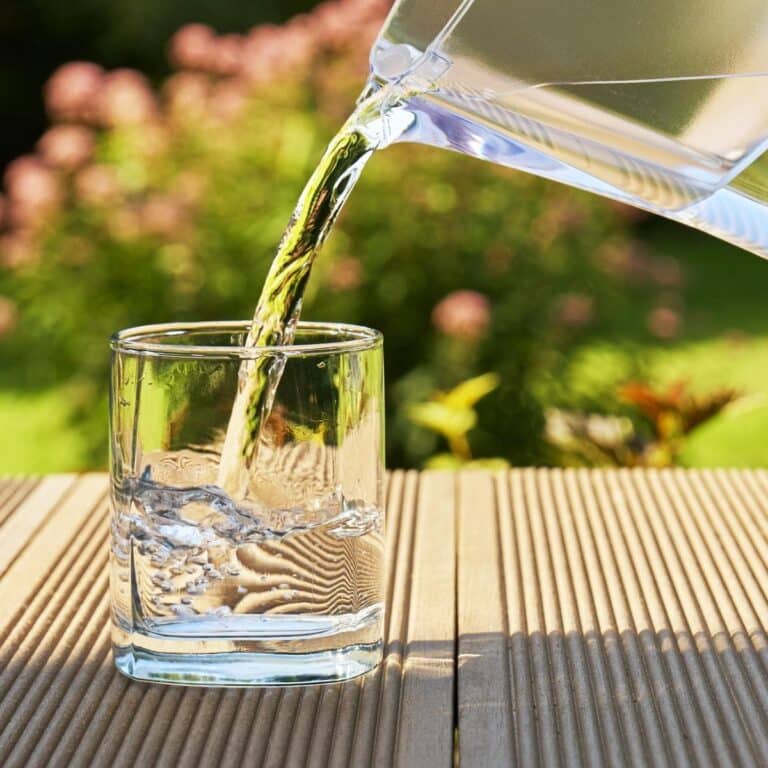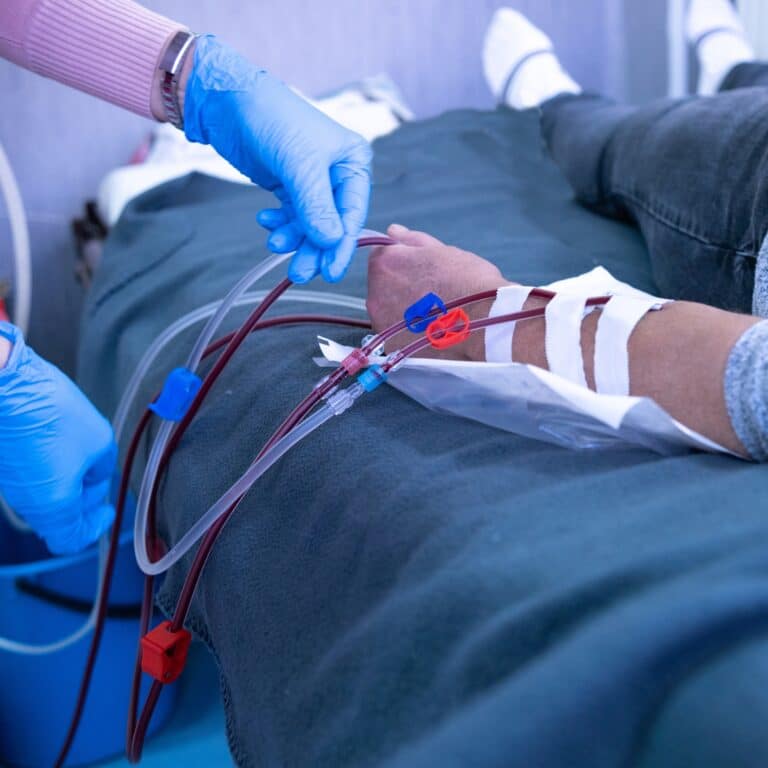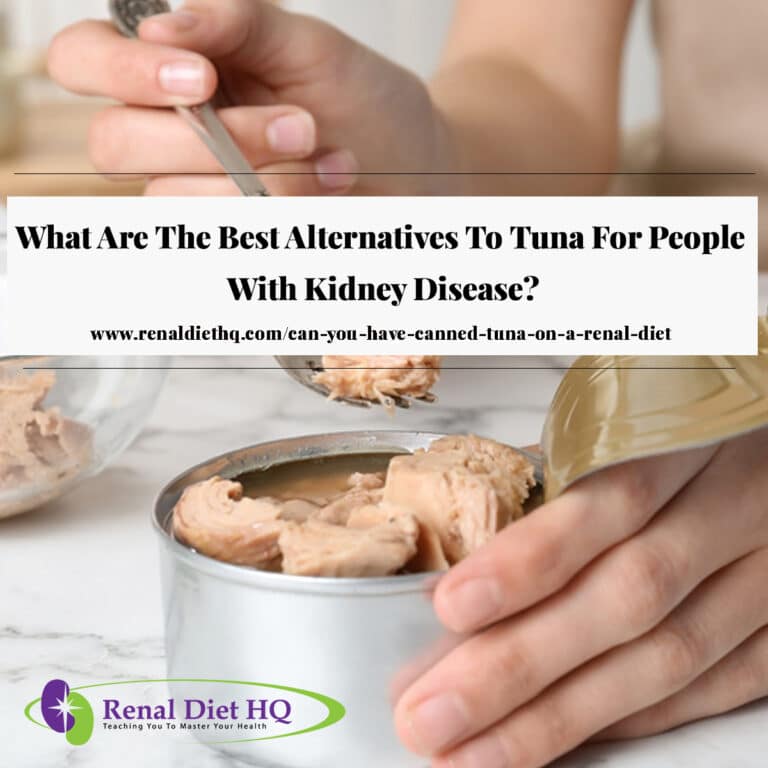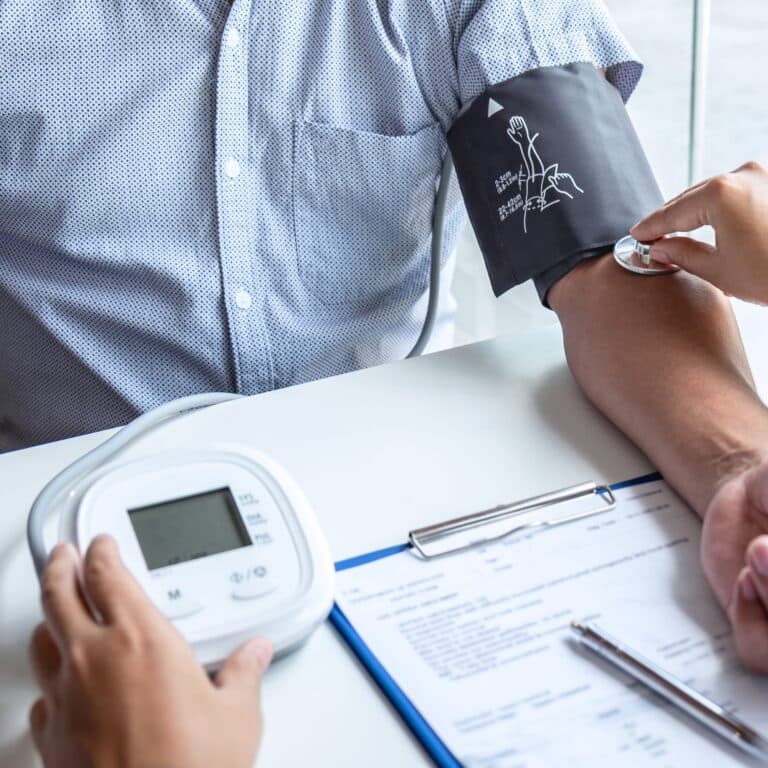Cholesterol and CKD
When you think of having a healthy heart, cholesterol is a word that may come up often. This is because having too much cholesterol in your body can be dangerous for your health – and your heart.
A gradual buildup of cholesterol plaque in the arteries could lead to peripheral artery disease; inevitably, those with the condition will be in search of medication for peripheral artery disease, and thus medical professionals to help them with their treatment.
It's also very important that you manage your cholesterol for your chronic kidney disease. Cholesterol can have harmful effects on your renal functions, if too much is present in the blood.
Jump to:
- Key Takeaways
- Cholesterol's Role in CKD
- Understanding Good Vs. Bad Cholesterol
- Cholesterol's Impact on Heart Health
- Statins and Early CKD Management
- Diet and Cholesterol in CKD
- Foods to Avoid or Limit
- Consult Your Doctor Regularly
- Factors Influencing Cholesterol Levels
- Monitoring and Managing Cholesterol
- Frequently Asked Questions
- Keeping Your Cholesterol In Check Is Important
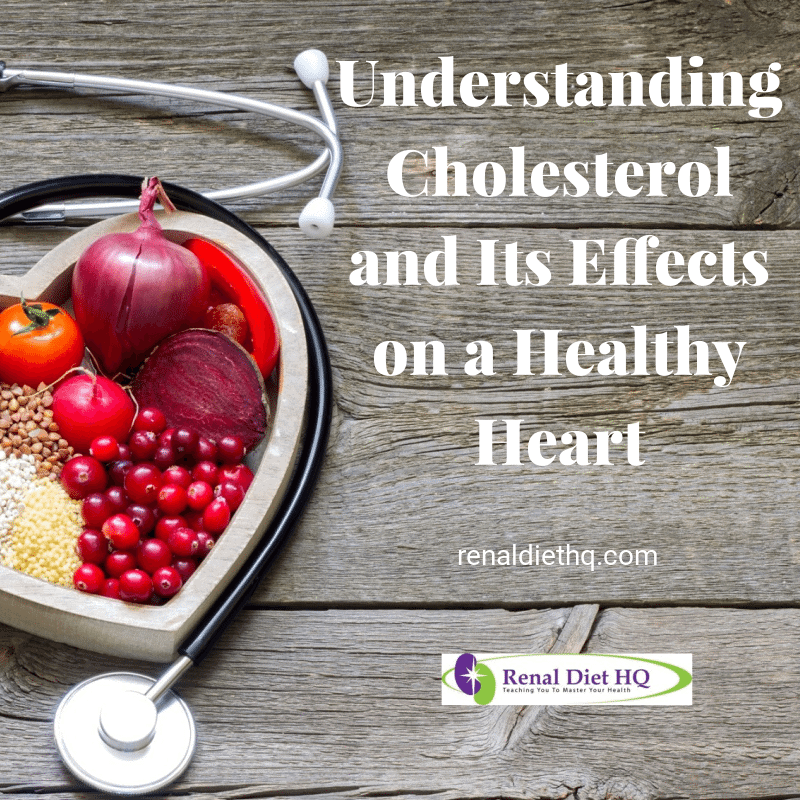
Key Takeaways
- High cholesterol is linked to kidney disease, with high total cholesterol, high LDL (bad cholesterol), and low HDL (good cholesterol) being common in individuals with poor kidney function.
- People with high cholesterol are about twice as likely to develop chronic kidney disease.
- Lowering cholesterol through medication, such as statins, and lifestyle changes, such as a high-fiber diet and exercise, can help reduce the risk of coronary disease, stroke, and further kidney damage in individuals with kidney disease.
- Monitoring cholesterol levels through regular lipid level tests and maintaining healthy cholesterol ranges is crucial for individuals with chronic kidney disease to prevent complications and maintain kidney function.
For More Recipes and Ideas --->> Get Your Free Meals and Recipes That Are Perfect for Pre-Dialysis Diets, Pre-Dialysis with Diabetes, or Dialysis Diets.
Cholesterol's Role in CKD
Cholesterol, a lipid crucial for body function, can impact kidney health, particularly in Chronic Kidney Disease (CKD). This fatty substance, essential for cell structure and hormone production, becomes problematic when levels are high, contributing to CKD complications.
Understanding cholesterol's role in CKD involves recognizing its influence on blood vessel health, potentially leading to kidney damage. Exploring cholesterol's intricate role in CKD sheds light on its impact and management for kidney health.
What Exactly is Cholesterol?
Cholesterol, a lipid, is a vital substance essential for building cells and producing hormones. It exists in two types: low-density lipoprotein (LDL) and high-density lipoprotein (HDL).
LDL, known as "bad" cholesterol, transports cholesterol through the bloodstream, potentially leading to plaque buildup in arteries. HDL, or "good" cholesterol, aids in removing excess cholesterol from the bloodstream, minimizing the risk of arterial blockages.
Cholesterol is acquired through diet and produced by the liver. While crucial for bodily functions, high LDL cholesterol levels can contribute to atherosclerotic events, endothelial dysfunction, and heart disease, making cholesterol management pivotal for overall health.
Cholesterol Impacts Kidney Function
Cholesterol can influence decline in kidney function by affecting blood vessels that supply the kidneys, potentially leading to a condition called atherosclerosis. High levels of LDL cholesterol can contribute to the formation of plaques in arteries, including those serving the kidneys. These plaques can restrict blood flow, impairing the kidneys' ability to filter waste and regulate fluids effectively.
Additionally, individuals with chronic kidney disease often experience alterations in lipid metabolism, leading to abnormal cholesterol levels. High cholesterol levels, particularly LDL, in people with kidney disease can accelerate kidney damage by promoting inflammation, oxidative stress, and worsening vascular health. This worsens the progression of kidney disease to end-stage renal disease, creating a cyclical impact where renal dysfunction further disrupts cholesterol regulation.
Managing cholesterol becomes critical in preserving kidney health, as it aids in minimizing the risk of atherosclerosis and maintaining proper blood flow to the kidneys. Controlling cholesterol levels, especially LDL cholesterol, through dietary changes, exercise, and medications, is essential in mitigating the risk of cardiovascular complications and further deterioration of kidney function in individuals with or at risk of CKD.
Understanding Good Vs. Bad Cholesterol
You need to recognize the critical roles of HDL and LDL cholesterol in your body's health.
While HDL cholesterol helps clear your arteries by transporting excess cholesterol to your liver for elimination, LDL cholesterol can lead to artery-clogging plaque, raising your risk for cardiovascular disease.
HDL Versus LDL
HDL (High-Density Lipoprotein) and LDL (Low-Density Lipoprotein) are two types of lipoproteins that transport cholesterol in the bloodstream. HDL is often termed "good" cholesterol as it scavenges excess cholesterol from arteries, transporting it back to the liver for removal, hence reducing plaque buildup.
This process aids in maintaining healthy arteries, lowering the risk of cardiovascular disease (CVD). Higher HDL-C levels are associated with a reduced risk of heart disease.
Conversely, LDL, termed "bad" cholesterol, carries cholesterol to cells, depositing it in arterial walls. Elevated LDL levels can lead to plaque formation, narrowing blood vessels and increasing the risk of CVD, including atherosclerosis and heart disease.
The balance between HDL and LDL is crucial. Higher HDL levels and lower LDL levels are generally associated with better cardiovascular health. However, in the context of kidney disease, LDL cholesterol, if elevated, can further contribute to kidney damage, emphasizing the importance of managing both types of cholesterol to safeguard kidney function.
Dietary Sources of Good and Bad Cholesterol
Dietary sources influence cholesterol levels, impacting health outcomes. Foods high in saturated and trans fats often contribute to increased LDL cholesterol levels.
Red meat, processed meats, full-fat dairy, fried foods, and commercially baked goods are common culprits. Trans fats, found in many processed and fried foods, raise LDL cholesterol while lowering HDL cholesterol, compounding the risk of heart disease.
Conversely, sources of HDL-raising foods include monounsaturated and polyunsaturated fats found in olive oil, avocados, nuts, seeds, and fatty fish rich in omega-3 fatty acids. Soluble fiber from oats, legumes, fruits, and vegetables can also aid in lowering LDL cholesterol levels.
Adopting a diet emphasizing these healthier fats, fiber-rich foods, and lean proteins while minimizing intake of processed and high-fat foods can positively impact cholesterol levels, supporting cardiovascular and kidney health.
Cholesterol's Impact on Heart Health
High cholesterol is a significant factor in the formation of artery plaque. This plaque can obstruct blood flow and heighten the risk of heart disease.
This is particularly critical if you're managing chronic kidney disease, as your cardiovascular health is already more vulnerable.
Artery Plaque Formation
When cholesterol levels, particularly LDL cholesterol, are elevated, they can undergo oxidative modification, triggering a cascade of events leading to arterial plaque formation. LDL cholesterol infiltrates the arterial walls, causing inflammation.
White blood cells attempt to eliminate these particles, transforming into foam cells and accumulating along the artery lining. This, coupled with calcium deposits and other substances, forms a fatty streak.
Over time, this streak can evolve into atherosclerotic plaques, thickening the artery walls and narrowing the vessel lumen. Plaques may rupture, leading to blood clot formation and potential blockages, increasing the risk of heart attacks (myocardial infarction) or strokes.
Lowering LDL cholesterol levels through diet, exercise, and medications can mitigate this process, reducing the risk of plaque formation and related cardiovascular complications.
Heart Disease Risk
Your body's cholesterol levels play a crucial role in heart health, with high amounts increasing your risk of heart disease significantly, especially when managing chronic kidney disease.
| Heart Disease Prevention | Cholesterol and Kidney Function Correlation |
| Cholesterol Lowering Medications | Statins may be prescribed, but consult your healthcare provider for suitability in advanced CKD. |
| Dietary Recommendations | Opt for whole grains, fruits, and vegetables; limit red meat and high-fat dairy products. |
| Lifestyle Modifications | Engage in regular physical activity and avoid smoking to improve heart and kidney health. |
| Monitoring | Keep track of your cholesterol levels, as CKD can alter lipid metabolism. |
Adhering to these guidelines not only supports heart health but also contributes to kidney care, creating a comprehensive approach to managing CKD.
Dangers of High Cholesterol for CKD Patients
If your cholesterol is found to be high, you must immediately take steps to lower it back to the healthy levels. If not, you can be putting yourself at risk for serious health concerns.
Elevated levels of cholesterol in the blood create plaque in the arteries. The result can be high systolic blood pressure as well as a condition called atherosclerosis.
Atherosclerosis is when the plaque buildup in your arteries hardens and makes it difficult for your heart to effectively pump blood throughout the body. It can lead to a number of even more serious complications, including:
- Coronary Heart Disease – When these arteries cannot supply enough blood to your heart, you may suffer a heart attack.
- Carotid Artery Disease – When these articles cannot supply enough oxygen-rich blood to your brain, you may suffer a stroke.
On top of the heart related medical conditions that high cholesterol can cause, it can also wreak havoc on your kidneys. This is why people with kidney disease should always have their cholesterol monitored and work to keep the levels in the healthy range.
When your cholesterol is too high, blood cannot properly flow to your organs, which includes your kidneys. This may speed up the deterioration of your kidney function.
Statins and Early CKD Management
As you manage early-stage chronic kidney disease, considering statins for cholesterol control is vital. These medications can be effective in lowering the risk of cardiovascular events, which is particularly important given the heightened risk associated with CKD.
The timing of statin prescription should align with clinical guidelines and individual risk assessment to optimize outcomes.
Statins' Effectiveness
Statins are medications designed to lower cholesterol levels in the bloodstream, primarily by inhibiting an enzyme crucial for cholesterol production in the liver. By reducing the liver's ability to produce cholesterol, we see the effects of statin therapy in lowering LDL cholesterol levels, thereby decreasing the risk of atherosclerosis and coronary events.
They also modestly increase HDL cholesterol (high density lipoprotein cholesterol) levels. The effects of statins have been remarkable in reducing cholesterol, notably LDL cholesterol (low density lipoprotein cholesterol), and are considered a cornerstone in managing high cholesterol levels. They've demonstrated substantial success in reducing the incidence of heart attacks, strokes, and other cardiovascular complications, especially when combined with lifestyle changes such as a healthy diet and regular exercise.
However, as with any medication, statins may have side effects, and their use requires monitoring by healthcare professionals.
Prescription And Adjustment
In Chronic Kidney Disease patients with dyslipidemia, managing cholesterol involves precise prescription adjustments due to altered kidney function. Statins, the primary lipid-lowering therapy, may require dosage modifications or avoidance in advanced CKD stages due to potential side effects and reduced efficacy.
Physicians opt for non-statin therapies like ezetimibe or bile acid sequestrants, which are often safer in CKD. Prescription adjustments consider individual kidney function to minimize risks while effectively managing cholesterol levels. Regular monitoring of both kidney function and cholesterol levels is vital, guiding physicians in tailoring prescriptions and ensuring optimal cholesterol management without compromising renal health in CKD patients.
This approach aims to strike a balance between cholesterol control and preserving kidney function, enhancing overall cardiovascular and renal health.
Diet and Cholesterol in CKD
As you manage your chronic kidney disease, it's critical to limit dietary fats that can exacerbate high cholesterol. You'll need to make cholesterol-friendly food choices, focusing on fruits, vegetables, and whole grains, while avoiding saturated and trans fats.
These dietary adjustments are proven to assist in maintaining healthier cholesterol levels and can potentially slow CKD progression.
Dietary Fat Restrictions
In a CKD diet aiming to control cholesterol levels, it's crucial to limit foods high in dietary fat and cholesterol. Sources high in saturated fats and cholesterol that should be restricted include fatty meats (like beef, pork, and processed meats), high-fat dairy products, full-fat cheeses, butter, organ meats, and egg yolks. Additionally, certain oils such as palm oil and coconut oil are high in saturated fats and should be limited.
Processed foods, commercially baked items, and fast food often contain trans fats, raising cholesterol levels and worsening CKD complications; these should be minimized. Foods high in cholesterol and unhealthy fats contribute to increased LDL ("bad") cholesterol levels, exacerbating cardiovascular risks.
Reducing the intake of these foods in a CKD diet helps manage cholesterol levels, mitigates cardiovascular risks, and supports overall kidney health. Opting for lean protein sources, plant-based fats, and whole grains can be beneficial in such dietary plans.
Cholesterol-friendly Food Choices
In managing your cholesterol levels with CKD, it's essential to select foods that support your heart and kidney health. You'll want to focus on cholesterol-friendly recipes that are low in saturated fats and high in fiber, which can naturally help reduce your cholesterol levels.
Here's a quick guide to making cholesterol-conscious choices:
| Food Group | Choose | Avoid |
| Dairy | Low-fat or non-fat options | Full-fat cheeses and milk |
| Proteins | Lean poultry, fish | Red and processed meats |
| Fats | Plant-based oils | Trans fats and saturated fats |
| Carbohydrates | Whole grains, vegetables, fruits | Refined sugars and grains |
Incorporate cholesterol lowering exercise into your routine, as physical activity can help improve your cholesterol profile. If you're considering cholesterol lowering supplements or medications, especially post-cholesterol and kidney transplant, always consult your healthcare provider for personalized advice.
Foods to Avoid or Limit
When managing cholesterol in chronic kidney disease, it's crucial to restrict your intake of high-fat dairy products, favoring low-fat options instead.
You should also minimize consumption of processed meats, as they're often high in unhealthy fats and can exacerbate cholesterol issues.
These dietary adjustments are supported by evidence linking saturated fats and certain processed foods to increased cardiovascular risk in CKD patients.
Restrict High-Fat Dairy
You should cut back on high-fat dairy products to help manage your cholesterol levels and support kidney health. The consumption of high-fat dairy can contribute to elevated cholesterol, which is a risk factor for both heart disease and chronic kidney disease.
Here are some strategies to consider:
- Opt for high-fat dairy alternatives like almond milk or soy milk, which are lower in saturated fats.
- Discuss cholesterol-lowering medications with your healthcare provider, especially if lifestyle changes don't lower your cholesterol sufficiently.
- Incorporate the impact of exercise into your routine; regular physical activity can improve cholesterol profiles.
- Adhere to dietary cholesterol guidelines to minimize the risk of cholesterol and kidney damage; choose low-fat or fat-free dairy options when available.
Minimize Processed Meats
Minimizing processed meats in a CKD diet is crucial for controlling cholesterol levels and preserving kidney health. Processed meats like bacon, sausage, deli meats, and certain canned meats are typically high in saturated fats and cholesterol, contributing to elevated LDL cholesterol levels. These foods are also associated with increased cardiovascular risks, particularly harmful for individuals with CKD due to their vulnerability to heart-related complications.
By reducing processed meat intake, one can effectively lower the consumption of unhealthy fats and cholesterol, supporting efforts to manage cholesterol levels and alleviate strain on the kidneys. Opting for leaner protein sources, such as poultry, fish, or plant-based alternatives, can be a healthier choice for individuals with CKD aiming to control cholesterol.
Consult Your Doctor Regularly
You must regularly consult with your healthcare provider to tailor cholesterol-lowering medications effectively, particularly if you're managing chronic kidney disease.
They'll guide you through necessary lifestyle adjustments, emphasizing the role of a balanced, nutritious diet and physical activity in your overall treatment plan. This proactive approach ensures that your therapy adapts to changes in your disease state and maximizes renal protection.
Medication Management
In managing cholesterol in patients with renal disease, doctors play a pivotal role in medication management. They assess individual health factors, including kidney function, to prescribe cholesterol-lowering medications suitable for renal health.
Doctors might opt for medications that are safe for kidneys and do not exacerbate kidney-related complications. They monitor medication dosages carefully, considering the patient's kidney function, potential drug interactions, and any existing medications for CKD or other conditions. Regular check-ups and lab tests help track cholesterol levels and kidney function, enabling timely adjustments to medications as needed.
This proactive approach ensures cholesterol management while safeguarding kidney health. Additionally, doctors provide guidance on lifestyle changes, dietary adjustments, and complementary therapies that complement medication to effectively control cholesterol levels in CKD patients.
Lifestyle Adjustment Guidance
To effectively manage your cholesterol and kidney health, it's crucial to consult with your doctor before making any lifestyle adjustments. Your physician can guide you through lifestyle modification strategies that are tailored to your specific needs, taking into account the impact of high cholesterol on kidney function. Dietary recommendations will likely form the cornerstone of these strategies, emphasizing the need for a balanced intake of nutrients to support both heart and renal health.
Adherence to cholesterol-lowering medications may be necessary, and the importance of regular monitoring can't be overstated. It ensures that interventions are effective and allows for adjustments as needed. By working closely with your healthcare provider, you can make informed choices that contribute to the preservation of your kidney function and overall well-being.
Factors Influencing Cholesterol Levels
You may not be able to control your genetic makeup, but it's essential to know that it can significantly influence your cholesterol levels.
If you're carrying extra weight, you're more likely to have higher levels of bad cholesterol.
It's vital to monitor and manage these factors to mitigate their impact on your cholesterol and kidney health.
Genetic Predisposition Impact
Your genetic makeup can significantly influence your cholesterol levels, often making you more susceptible to high cholesterol regardless of lifestyle choices. Studies linking cholesterol and kidney function have consistently shown that genetic predisposition impact can't be understated.
Cholesterol's role in kidney disease is complex, as it not only contributes to the disease but is also affected by it. Understanding how cholesterol impacts kidney function is crucial for managing cholesterol in kidney disease effectively.
- Familial hypercholesterolemia: a genetic disorder causing high LDL cholesterol levels
- Apolipoprotein E gene variations: affecting cholesterol metabolism and kidney disease progression
- PCSK9 gene mutations: influencing LDL receptor function and cholesterol levels
- Genetic screening: may identify individuals at risk and tailor strategies for cholesterol management in kidney disease
Weight Influences Levels
Often, carrying excess weight can raise your cholesterol levels, further complicating kidney health management. Your weight management plays a critical role in preventing cholesterol and kidney damage. Adhering to dietary guidelines, you can mitigate these risks. It's not just about eating less; it's about eating smart.
| Factor | Impact on Cholesterol | Recommended Action |
| Weight Management | Reduces LDL | Adopt a balanced, calorie-appropriate diet |
| Exercise Benefits | Increases HDL | Regular physical activity |
| Cholesterol Lowering Medications | Lowers LDL | Consult with your healthcare provider |
Cholesterol lowering medications may be advised alongside lifestyle changes. Remember, every step towards a healthier weight is a step towards better kidney health.
Monitoring and Managing Cholesterol
As you navigate the complexities of chronic kidney disease (CKD), it's crucial to regularly monitor your cholesterol levels through lipid tests to assess your risk for cardiovascular complications.
Implementing lifestyle modifications, such as a balanced diet rich in fruits, vegetables, and whole grains, becomes an essential part of managing your cholesterol.
Together with your healthcare team, you can establish a comprehensive plan that includes both medication and dietary strategies to maintain optimal cholesterol levels and protect kidney function.
Regular Lipid Tests
For individuals, especially those with CKD, regular lipid profile tests are crucial to monitor cholesterol levels and cardiovascular health. This blood test typically requires fasting for accurate results, often overnight or for about 8–12 hours, ensuring lipid measurements aren't influenced by recent meals. During the test, blood sample is drawn and analyzed to measure various lipid components, including total cholesterol, LDL cholesterol, HDL cholesterol, and triglycerides.
The lipid profile provides insights into the risk of cardiovascular disease, enabling healthcare providers to tailor interventions and medication adjustments if necessary. Monitoring these levels helps in evaluating the effectiveness of treatments, lifestyle modifications, and medication regimens aimed at managing cholesterol in CKD patients. Regular lipid profile tests also aid in tracking changes over time, guiding doctors in fine-tuning treatment plans and ensuring optimal cardiovascular health while considering kidney-related factors.
A Holistic Approach To Cholesterol Management
Managing cholesterol through a holistic approach—combining medical interventions with lifestyle modifications—proffers comprehensive benefits for overall health. While medications like statins aid in lowering cholesterol, lifestyle adjustments such as diet and exercise play pivotal roles. This holistic strategy not only targets cholesterol levels but also supports cardiovascular health, crucial for individuals, particularly those with CKD, prone to cardiovascular complications.
Integrating lifestyle modifications—adopting a heart-healthy diet low in saturated fats, regular physical activity, and weight management—enhances the effectiveness of cholesterol-lowering medications. This combined approach minimizes cardiovascular risk factors, potentially reducing the burden on kidneys and mitigating complications in CKD. Emphasizing lifestyle changes alongside medical management ensures a multifaceted defense against elevated cholesterol levels, enhancing overall well-being and reducing the risk of cardiovascular events in individuals managing CKD.
Frequently Asked Questions
While some cholesterol-lowering supplements may offer mild benefits, they are not considered a safe alternative to statins for CKD patients. Statins have robust clinical evidence supporting their efficacy in cardiovascular risk reduction.
Supplements lack the same level of evidence and may have variable effects. CKD patients should consult healthcare providers to determine the most appropriate cholesterol management strategy, considering individual health status and potential interactions with renal function.
The progression of Chronic Kidney Disease impairs the body's ability to respond to typical cholesterol-lowering strategies. As kidney function declines, there's reduced clearance of cholesterol by the kidneys, leading to dyslipidemia.
Additionally, CKD disrupts the metabolism of lipoproteins and alters the balance of various lipid components. Consequently, traditional approaches such as statins may be less effective, necessitating personalized management strategies that consider the evolving metabolic changes associated with advancing CKD stages.
Yes, certain medications for Chronic Kidney Disease, such as phosphate binders, can interact with cholesterol metabolism. They may bind to bile acids, affecting cholesterol absorption. Additionally, some CKD medications and dialysis procedures may alter lipid profiles.
These interactions emphasize the importance of a nuanced approach to cholesterol management in CKD patients, considering both kidney function and potential medication interactions when prescribing cholesterol-lowering drugs. Regular monitoring and adjustments are crucial for optimizing therapeutic outcomes.
Keeping Your Cholesterol In Check Is Important
Understanding cholesterol's multifaceted impact on kidney health is crucial, especially in Chronic Kidney Disease. High cholesterol levels can disrupt kidney function, impacting blood vessels and potentially leading to atherosclerosis.
Managing cholesterol involves comprehending the roles of "good" (HDL) and "bad" (LDL) cholesterol—HDL clears arteries, while LDL contributes to plaque formation, affecting cardiovascular health. High LDL levels can worsen CKD by impairing blood flow to the kidneys. Medications like statins assist in lowering cholesterol, but a holistic approach incorporating diet, exercise, and tailored prescriptions optimizes outcomes, vital for both kidney and heart health in CKD patients.
Balancing lifestyle changes with medical management ensures comprehensive cholesterol control, reducing risks and supporting overall well-being in CKD management.





